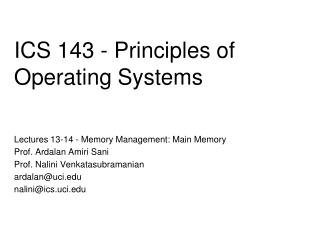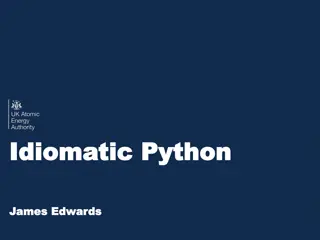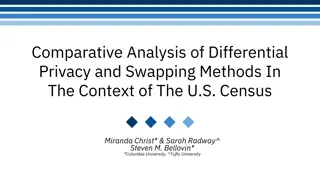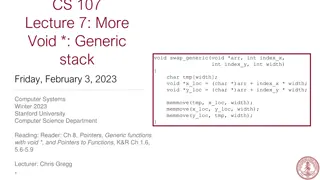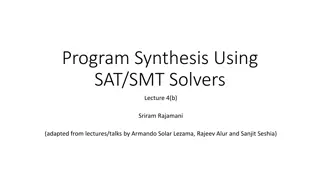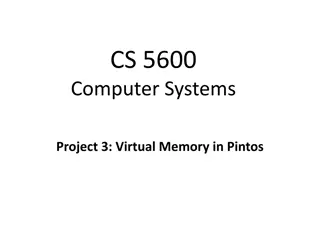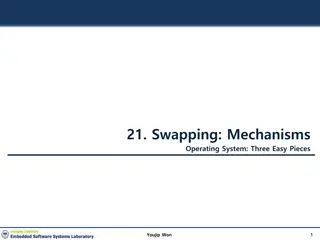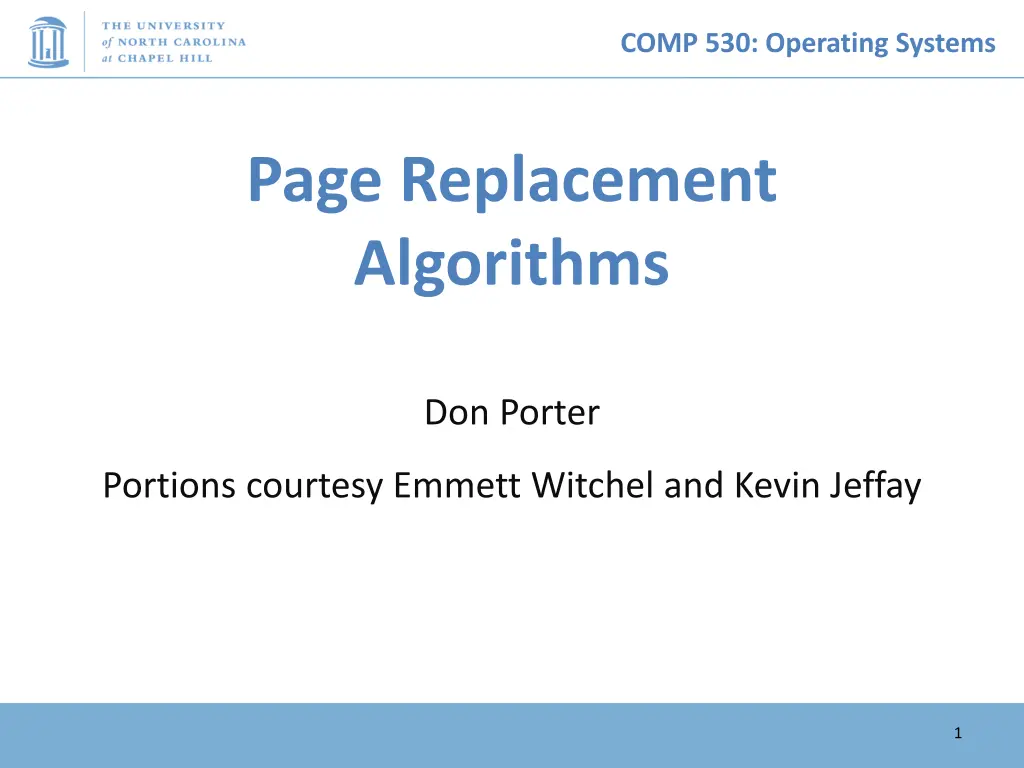
Operating Systems Page Replacement Algorithms Overview
Dive into COMP.530 Operating Systems and explore key concepts such as virtual memory management, page replacement strategies, and evaluation methodologies. Learn about demand paging, placement strategies, and the optimal strategy for page replacement. Understand the importance of efficient memory management and how different algorithms handle page faults.
Download Presentation

Please find below an Image/Link to download the presentation.
The content on the website is provided AS IS for your information and personal use only. It may not be sold, licensed, or shared on other websites without obtaining consent from the author. If you encounter any issues during the download, it is possible that the publisher has removed the file from their server.
You are allowed to download the files provided on this website for personal or commercial use, subject to the condition that they are used lawfully. All files are the property of their respective owners.
The content on the website is provided AS IS for your information and personal use only. It may not be sold, licensed, or shared on other websites without obtaining consent from the author.
E N D
Presentation Transcript
COMP 530: Operating Systems Page Replacement Algorithms Don Porter Portions courtesy Emmett Witchel and Kevin Jeffay 1
COMP 530: Operating Systems Virtual Memory Management: Recap Key concept: Demand paging Load pages into memory only when a page fault occurs User Program n ... Issues: Placement strategies Place pages anywhere no placement policy required User Program 2 User Program 2 User Program 1 Replacement strategies What to do when there exist more jobs than can fit in memory Operating System Load control strategies Determining how many jobs can be in memory at one time Memory
COMP 530: Operating Systems Page Replacement Algorithms Typically iVASi >> Physical Memory With demand paging, physical memory fills quickly When a process faults & memory is full, some page must be swapped out Handling a page fault now requires 2 disk accesses not 1! Which page should be replaced? Local replacement Replace a page of the faulting process Global replacement Possibly replace the page of another process
COMP 530: Operating Systems Page Replacement: Eval. Methodology Record a trace of the pages accessed by a process Example: (Virtual page, offset) address trace... (3,0), (1,9), (4,1), (2,1), (5,3), (2,0), (1,9), (2,4), (3,1), (4,8) generates page trace 3, 1, 4, 2, 5, 2, 1, 2, 3, 4 (represented as c, a, d, b, e, b, a, b, c, d) Hardware can tell OS when a new page is loaded into the TLB Set a used bit in the page table entry Increment or shift a register Simulate the behavior of a page replacement algorithm on the trace and record the number of page faults generated fewer faults better performance
COMP 530: Operating Systems Optimal Strategy: Clairvoyant Replacement Replace the page that won t be needed for the longest time in the future Initial allocation 0 1 2 3 4 5 6 7 8 9 10 Time c a d b e b a b c d Requests Frames 0 a b c d 1 2 3 Page Faults Time page needed next
COMP 530: Operating Systems Optimal Strategy: Clairvoyant Replacement Replace the page that won t be needed for the longest time in the future 0 1 2 3 4 5 6 7 8 9 10 Time c a d b e b a b c d Requests 0 1 2 3 a b c d a b c d a b c d a b c d a b c d a b c e a b c e a b c e a b c e a b c e d b c e Frames Page Faults a = 7 b = 6 c = 9 d = 10 a = 15 b = 11 c = 13 d = 14 Time page needed next
COMP 530: Operating Systems Local Replacement: FIFO Simple to implement A single pointer suffices Physical Memory 0 1 2 Performance with 4 page frames: Frame List Time 0 1 2 3 4 5 6 7 8 9 10 c a d b e b a b c d Requests Frames 0 a b c d Page 1 2 3 Faults
COMP 530: Operating Systems Local Replacment: FIFO Simple to implement A single pointer suffices Physical Memory 3 0 2 Performance with 4 page frames: Frame List Time 0 1 2 3 4 5 6 7 8 9 10 c a b c d a a b c d d a b c d b a b c d e e b c d b e b c d a e a c d b e a b d c e a b c d d a b c Requests 0 1 2 3 a b c d Frames Page Faults
COMP 530: Operating Systems Least Recently Used (LRU) Replacement Use the recent past as a predictor of the near future Replace the page that hasn t been referenced for the longest time Time 0 1 2 3 4 5 6 7 8 9 10 c a d b e b a b c d Requests Frames 0 a b c d Page 1 2 3 Faults Time page last used
COMP 530: Operating Systems Least Recently Used (LRU) Replacement Use the recent past as a predictor of the near future Replace the page that hasn t been referenced for the longest time Time 0 1 2 3 4 5 6 7 8 9 10 c a b c d a a b c d d a b c d b a b c d e a b e d b a b e d a a b e d b a b e d c a b e c d a b d c Requests 0 1 2 3 a b c d Frames Page a = 7 b = 8 e = 5 c = 9 Faults a = 2 b = 4 c = 1 d = 3 a = 7 b = 8 e = 5 d = 3 Time page last used
COMP 530: Operating Systems How to Implement LRU? Maintain a stack of recently used pages 0 1 2 3 4 5 6 7 8 9 10 Time c a d b e b a b c d Requests 0 1 2 3 a b c d a b c d a b c d a b c d a b c d a b e d a b e d a b e d a b e d a b e c a b d c Frames Page Faults LRU page stack Page to replace
COMP 530: Operating Systems How to Implement LRU? Maintain a stack of recently used pages 0 1 2 3 4 5 6 7 8 9 10 Time c a d b e b a b c d Requests 0 1 2 3 a b c d a b c d a b c d a b c d a b c d a b e d a b e d a b e d a b e d a b e c a b d c Frames Page Faults c a d b e b a b c d LRU page stack c a d b e b a b c c a d d e e a b c a a d d e a Page to replace d e c
COMP 530: Operating Systems What is the goal of a page replacement algorithm? A. Make life easier for OS implementer B. Reduce the number of page faults C. Reduce the penalty for page faults when they occur D. Minimize CPU time of algorithm
COMP 530: Operating Systems Approximate LRU: The Clock Algorithm Maintain a circular list of pages resident in memory Use a clock (or used/referenced) bit to track how often a page is accessed The bit is set whenever a page is referenced Clock hand sweeps over pages looking for one with used bit = 0 Replace pages that haven t been referenced for one complete revolution of the clock Page 7:1 1 0 func Clock_Replacement begin while (victim page not found) do if(used bit for current page = 0) then replace current page else reset used bit end if advance clock pointer end while end Clock_Replacement Page 1:1 0 5 Page 4:1 0 3 Page 3:1 1 1 Page 0:1 1 4 resident bit used bit frame number
COMP 530: Operating Systems Clock Example 2 3 4 5 6 7 8 9 10 1 0 Time a d b e b a b c d c Requests a a a a Frames 0 a b c d b b b b 1 2 3 Page c c c c d d d d Faults 1 1 1 1 a b c d Page table entries for resident pages:
COMP 530: Operating Systems Clock Example 2 3 4 5 6 7 8 9 10 1 0 Time a d b e b a b c d c Requests a a a e e e e e d a Frames 0 a b c d b b b b b b b b b b 1 2 3 Page c c c c c a a a a c d d d d d d d c c d Faults 1 1 1 1 a b c d 1 0 0 0 e b c d 1 1 0 0 e b c d 1 1 1 0 e b a d 1 1 1 0 e b a d 1 1 1 1 e b a c 1 0 0 0 d b a c Page table entries for resident pages:
COMP 530: Operating Systems Optimization: Second Chance Algorithm There is a significant cost to replacing dirty pages Why? Must write back contents to disk before freeing! Modify the Clock algorithm to allow dirty pages to always survive one sweep of the clock hand Use both the dirty bit and the used bit to drive replacement Page 7: 1 1 0 0 Second Chance Algorithm Before clock sweep After clock sweep Page 1: 1 Page 4: 1 0 0 5 0 0 3 used dirty used dirty replace page 0 0 1 1 0 1 0 1 0 0 0 0 0 1 Page 3: 1 Page 0: 1 1 1 9 1 1 4 resident bit used bit frame number
COMP 530: Operating Systems Second Chance Example 2 3 4 5 6 7 8 9 10 1 0 Time aw bw aw d e b b c d c Requests a a a a Frames 0 a b c d b b b b 1 2 3 Page c c c c d d d d Faults a b c d 10 Page table entries for resident pages: 10 10 10
COMP 530: Operating Systems Second Chance Example 2 3 4 5 6 7 8 9 10 1 0 Time aw bw aw d e b b c d c Requests a a a a a a a a a a Frames 0 a b c d b b b b b b b b d b 1 2 3 Page c c c e e e e e e c d d d d d d d c c d Faults Page table entries for resident pages: a* b* e d a* d e c a b c d a b c d a b e d a b e d a b e c 10 11 00 00 11 11 00 10 11 00 10 10 10 10 10 10 10 10 10 10 00 10 10 00 00 00 10 00
COMP 530: Operating Systems Local Replacement and Memory Sensitivity 0 1 2 3 4 5 6 7 8 9 10 11 12 Time a b c d a b c d a b c d Requests 0 a Frames Page 1 b 2 c Faults 0 a Frames Page 1 b 2 c 3 Faults
COMP 530: Operating Systems Local Replacement and Memory Sensitivity 0 1 2 3 4 5 6 7 8 9 10 11 12 Time a b c d a b c d a b c d Requests 0 a a a a d d d c c c b b b Frames Page 1 b b b b b a a a d d d c c 2 c c c c c c b b b a a a d Faults a a a a a a a a a a a a 0 a Frames b b b b b b b b b b b b Page 1 b c c c c c c c c c c c c 2 c d d d d d d d d d 3 Faults
COMP 530: Operating Systems Page Replacement Performance Local page replacement LRU Ages pages based on when they were last used FIFO Ages pages based on when they re brought into memory Towards global page replacement ... with variable number of page frames allocated to processes The principle of locality 90% of the execution of a program is sequential Most iterative constructs consist of a relatively small number of instructions When processing large data structures, the dominant cost is sequential processing on individual structure elements Temporal vs. physical locality
COMP 530: Operating Systems Optimal Replacement with a Variable Number of Frames VMIN Replace a page that is not referenced in the next accesses Example: = 4 0 Time 1 2 3 4 5 6 7 8 9 10 c c d b c e c e a d Requests Page a Page b Page c Page d Page e - - - in Memory t = 0 Pages t = -1 Faults
COMP 530: Operating Systems Optimal Replacement with a Variable Number of Frames VMIN Replace a page that is not referenced in the next accesses Example: = 4 0 Time 1 2 3 4 5 6 7 8 9 10 c - - F - c - - - d - - - b - F - - c - - - - e - - - F c - - - e - - - - a F - - - - d - - - F - Requests Page a Page b Page c Page d Page e - - - in Memory t = 0 Pages t = -1 Faults
COMP 530: Operating Systems The Working Set Model Assume recently referenced pages are likely to be referenced again soon ... and only keep those pages recently referenced in memory (called the working set) Thus pages may be removed even when no page fault occurs The number of frames allocated to a process will vary over time A process is allowed to execute only if its working set fits into memory The working set model performs implicit load control
COMP 530: Operating Systems Working Set Page Replacement Keep track of the last references (including faulting reference) The pages referenced during the last memory accesses are the working set is called the window size Example: Working set computation, = 4 references: 0 Time 1 2 3 4 5 6 7 8 9 10 c c d b c e c e a d Requests Page a Page b Page c Page d Page e - - t = -2 in Memory t = 0 Pages t = -1 Faults
COMP 530: Operating Systems Working Set Page Replacement Keep track of the last references The pages referenced during the last memory accesses are the working set is called the window size Example: Working set computation, = 4 references: 0 Time 1 2 3 4 5 6 7 8 9 10 c - F c - - d - - b - F - c - - e - F c - - e - - - a F - - d - F Requests Page a Page b Page c Page d Page e - - t = -2 in Memory t = 0 Pages t = -1 Faults
COMP 530: Operating Systems Page-Fault-Frequency Page Replacment An alternate approach to computing working set Explicitly attempt to minimize page faults When page fault frequency is high increaseworkingset When page fault frequency is low decreaseworkingset Algorithm: Keep track of the rate at which faults occur When a fault occurs, compute the time since the last page fault Record the time, tlast, of the last page fault If the time between page faults is large then reduce the working set If tcurrent tlast > , then remove from memory all pages not referenced in [tlast, tcurrent ] If the time between page faults is small then increase working set If tcurrent tlast , then add faulting page to the working set
COMP 530: Operating Systems Page Fault Frequency Replacement Example, window size = 2 If tcurrent tlast > 2, remove pages not referenced in [tlast, tcurrent ] from the working set If tcurrent tlast 2, just add faulting page to the working set 0 Time 1 2 3 4 5 6 7 8 9 10 c c d b c e c e a d Requests Page a Page b Page c Page d Page e - - in Memory Pages Faults tcur tlast
COMP 530: Operating Systems Page Fault Frequency Replacement Example, window size = 2 If tcurrent tlast > 2, remove pages not referenced in [tlast, tcurrent ] from the working set If tcurrent tlast 2, just add faulting page to the working set 0 Time 1 2 3 4 5 6 7 8 9 10 c - F c - d - b - F - c - - e - F c - e - a F - - d - F Requests Page a Page b Page c Page d Page e - - in Memory Pages Faults tcur tlast 1 3 2 3 1
COMP 530: Operating Systems Load Control: Fundamental Trade-off High multiprogramming level number of page frames MPLmax = minimum number of frames required for a process to execute Low paging overhead MPLmin = 1 process Issues What criterion should be used to determine when to increase or decrease the MPL? Which task should be swapped out if the MPL must be reduced?
COMP 530: Operating Systems Load Control Done Wrong I/O Device i.e., based on CPU utilization ... CPU Paging Device Assume memory is nearly full A chain of page faults occur A queue of processes forms at the paging device CPU utilization falls Operating system increases MPL New processes fault, taking memory away from existing processes CPU utilization goes to 0, the OS increases the MPL further... System is thrashing spending all of its time paging
COMP 530: Operating Systems Load Control and Thrashing Thrashing can be ameliorated by local page replacement Better criteria for load control: Adjust MPL so that: mean time between page faults (MTBF) = page fault service time (PFST) WSi = size of memory 1.0 1.0 CPU MTBF PFST Utilization Nmax NI/O-BALANCE Multiprogramming Level
COMP 530: Operating Systems Load Control and Thrashing Physical Memory Ready Running ? ready queue Waiting Suspended suspended queue semaphore/condition queues When the multiprogramming level should be decreased, which process should be swapped out? Lowest priority process? Smallest process? Largest process? Oldest process? Faulting process? Paging Disk

